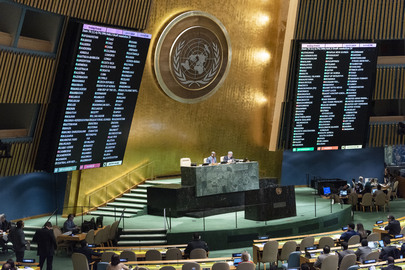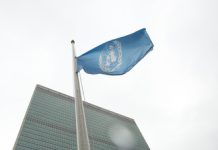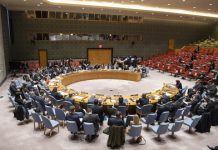This is the News in Brief from the United Nations.
Gaza: 8,000 children diagnosed with malnutrition amid ongoing shelling
Heavy shelling reported in the so-called safe zone of Al-Mawasi in southern Gaza on Thursday came despite the ongoing international push for a ceasefire and as the UN health agency reported 32 deaths from malnutrition, most being children under five years old.
After more than eight months of war, the head of the UN World Health Organization (WHO), Tedros Adhanom Ghebreyesus warned that “a significant proportion of Gaza’s population is now facing catastrophic hunger and famine-like conditions”.
“Over 8,000 children under five years old have been diagnosed and treated for acute malnutrition, including 1,600 children with severe acute malnutrition…There have already been 32 deaths attributed to malnutrition, including 28 among children under five years old.”
Because of the ongoing war and lack of access, only two stabilization centres for severely malnourished patients can operate, Tedros told journalists on Wednesday.
And he said that despite reports of increased food deliveries in Gaza, “there is
Worldwide levels of forced di splacement hit ne w high: UNHCR
A record 120 million people have been forced from their homes because of violence or persecution for the 12th consecutive year.
That’s according to the UN refugee agency (UNHCR) which published updated data in its 2024 Global Trends Report on Thursday.
Ongoing crises and newly emerging and evolving conflicts are to blame, including the war in Sudan, which uprooted 10.8 million people alone by the end of 2023.
Millions more were internally displaced in the Democratic Republic of the Congo and Myanmar last year because of heavy fighting.
The UNHCR report also said that the UN agency for Palestinian refugees estimated that about 75 per cent of the population in the Gaza Strip have been displaced – some 1.7 million people.
Here’s Filippo Grandi, the UN High Commissioner for Refugees:
“These are refugees, asylum seekers, internally displaced people, people being forced by conflict, by persecution, by different and increasingly complex forms of violence that had to flee their homes either in their own countries or crossing borders and becoming refugees.”
The UN refugee agency chief said that behind the rising numbers “lie countless human tragedies”, as he urged the international community to act urgently to tackle the root causes of forced displacement – and warring parties to respect the basic laws of war regarding the protection of civilians.
According to UNHCR, Syria holds the record for sheer numbers of uprooted people, with 13.8 million forcibly displaced in the country and beyond its borders.
African nations not spending enough on quality education for children: UNICEF
To Africa, where the UN Children’s Fund, UNICEF, said on Thursday that most governments are not spending enough money on quality education.
Fewer than one in five African countries have in fact allocated 20 per cent of their national budget on education, in line with 2030 targets linked to the Sustainable Development Goals.
In an education report published ahead of Sunday’s Day of the African Child, UNICEF warned that despite “considerable progress” in boosting primary and lower secondary enrolment over the past decade, many African schools “are underfunded, classrooms overcrowded and there are insufficient teachers – many without adequate training”.
A lack of financing is to blame, the UN agency said, noting that it continues to leave millions of children unable to acquire the skills needed for them and their countries to thrive in the future.
Around $183 billion is needed for children’s education in African countries every year to reach Sustainable Development Goals targets, but available resources stand at only $106 billion, UNICEF said.
Daniel Johnson, UN News.
Source of original article: United Nations (news.un.org). Photo credit: UN. The content of this article does not necessarily reflect the views or opinion of Global Diaspora News (www.globaldiasporanews.com).
To submit your press release: (https://www.globaldiasporanews.com/pr).
To advertise on Global Diaspora News: (www.globaldiasporanews.com/ads).
Sign up to Global Diaspora News newsletter (https://www.globaldiasporanews.com/newsletter/) to start receiving updates and opportunities directly in your email inbox for free.





























